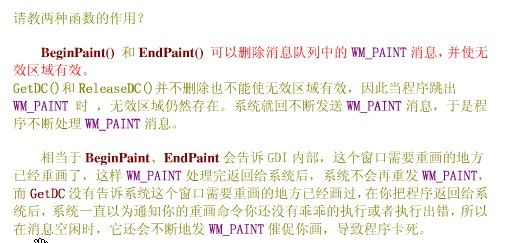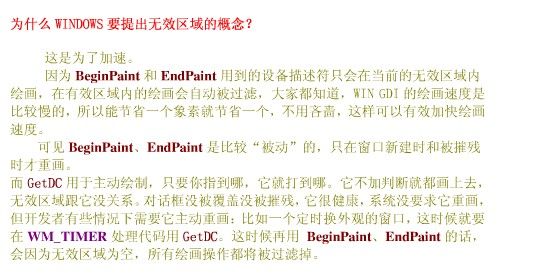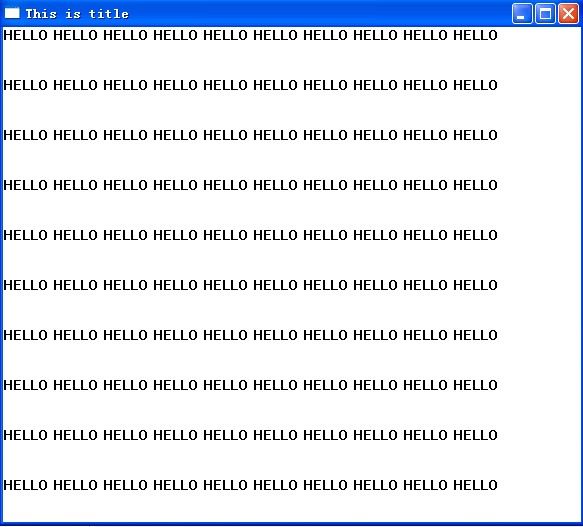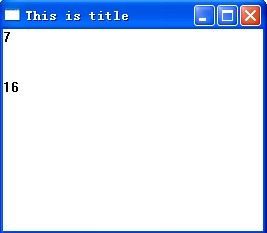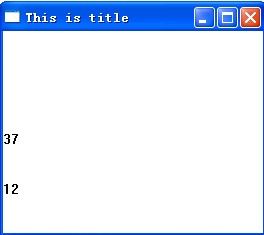两种获取HDC的方法和TextOut输出
windows32挺好玩的,买本windows32的书,慢慢啃,理解windows32到底是怎么工作的,尤其是消息循环这一块,其实windows32最重要的就是你写的proc函数,消息循环接收任何消息,都调用你写的windowproc函数,如果有人觉得windows32入门很痛苦,建议大家看看孙鑫的c++20讲之第一讲,保证有收获。
windows32不用重头到尾都自己敲代码,可以有技巧的使用MSDN,可以复制函数原型... 写了第一遍了,第二遍就可以拷贝第一遍写的,然后改就行了。
有两种方法可以获取HDC(设备环境句柄)
1成对使用BeginPaint(hwnd,&ps),EndPaint(hwnd,&ps);
2成对使用GetDC(hwnd),ReleaseDC(hwnd,hdc);
就在刚刚,我分别用了两种方法测试了下效果:
#include<windows.h>
LRESULT CALLBACK WindowProc(
HWND hwnd, // handle to window
UINT uMsg, // message identifier
WPARAM wParam, // first message parameter
LPARAM lParam // second message parameter
);
int WINAPI WinMain(
HINSTANCE hInstance, // handle to current instance
HINSTANCE hPrevInstance, // handle to previous instance
LPSTR lpCmdLine, // command line
int nCmdShow // show state
)
{
static TCHAR szAppName[]=TEXT("AppName");
HWND hwnd;
MSG msg;
WNDCLASS wndclass;
wndclass.cbClsExtra=0;
wndclass.cbWndExtra=0;
wndclass.hbrBackground=(HBRUSH)GetStockObject(WHITE_BRUSH);
wndclass.hCursor=LoadCursor(NULL,IDC_ARROW);
wndclass.hIcon=LoadIcon(NULL,IDI_APPLICATION);
wndclass.hInstance=hInstance;
wndclass.lpfnWndProc=WindowProc;
wndclass.lpszClassName=szAppName;
wndclass.lpszMenuName=NULL;
wndclass.style=CS_HREDRAW|CS_VREDRAW;
if(!RegisterClass(&wndclass)){
MessageBox(NULL,TEXT("This program requires Windows NT"),szAppName,MB_ICONERROR);
}
hwnd=CreateWindow(
szAppName, // registered class name
TEXT("This is title"), // window name
WS_OVERLAPPEDWINDOW, // window style
CW_USEDEFAULT, // horizontal position of window
CW_USEDEFAULT, // vertical position of window
CW_USEDEFAULT, // window width
CW_USEDEFAULT, // window height
NULL, // handle to parent or owner window
NULL, // menu handle or child identifier
hInstance, // handle to application instance
NULL // window-creation data
);
ShowWindow(hwnd,nCmdShow);
UpdateWindow(hwnd);
while(GetMessage(&msg,NULL,0,0)){
TranslateMessage(&msg);
DispatchMessage(&msg);
}
return msg.wParam;
}
LRESULT CALLBACK WindowProc(
HWND hwnd, // handle to window
UINT uMsg, // message identifier
WPARAM wParam, // first message parameter
LPARAM lParam // second message parameter
)
{
HDC hdc;
PAINTSTRUCT ps;
TCHAR zsBuffer[20];
switch(uMsg){
case WM_CREATE:
//hdc=GetDC(hwnd);
//TextOut(hdc,0,0,TEXT("hello,world"),strlen("hello,world"));
//ReleaseDC(hwnd,hdc);
return 0;
case WM_PAINT:
hdc=BeginPaint(hwnd,&ps);
TextOut(hdc,0,0,TEXT("WM_PAINT"),strlen("WM_PAINT"));
EndPaint(hwnd,&ps);
return 0;
case WM_DESTROY:
PostQuitMessage(0);
return 0;
}
return DefWindowProc(hwnd,uMsg,wParam,lParam);
}
跟预想的效果一样。
但是:
#include<windows.h>
LRESULT CALLBACK WindowProc(
HWND hwnd, // handle to window
UINT uMsg, // message identifier
WPARAM wParam, // first message parameter
LPARAM lParam // second message parameter
);
int WINAPI WinMain(
HINSTANCE hInstance, // handle to current instance
HINSTANCE hPrevInstance, // handle to previous instance
LPSTR lpCmdLine, // command line
int nCmdShow // show state
)
{
static TCHAR szAppName[]=TEXT("AppName");
HWND hwnd;
MSG msg;
WNDCLASS wndclass;
wndclass.cbClsExtra=0;
wndclass.cbWndExtra=0;
wndclass.hbrBackground=(HBRUSH)GetStockObject(WHITE_BRUSH);
wndclass.hCursor=LoadCursor(NULL,IDC_ARROW);
wndclass.hIcon=LoadIcon(NULL,IDI_APPLICATION);
wndclass.hInstance=hInstance;
wndclass.lpfnWndProc=WindowProc;
wndclass.lpszClassName=szAppName;
wndclass.lpszMenuName=NULL;
wndclass.style=CS_HREDRAW|CS_VREDRAW;
if(!RegisterClass(&wndclass)){
MessageBox(NULL,TEXT("This program requires Windows NT"),szAppName,MB_ICONERROR);
}
hwnd=CreateWindow(
szAppName, // registered class name
TEXT("This is title"), // window name
WS_OVERLAPPEDWINDOW, // window style
CW_USEDEFAULT, // horizontal position of window
CW_USEDEFAULT, // vertical position of window
CW_USEDEFAULT, // window width
CW_USEDEFAULT, // window height
NULL, // handle to parent or owner window
NULL, // menu handle or child identifier
hInstance, // handle to application instance
NULL // window-creation data
);
ShowWindow(hwnd,nCmdShow);
UpdateWindow(hwnd);
while(GetMessage(&msg,NULL,0,0)){
TranslateMessage(&msg);
DispatchMessage(&msg);
}
return msg.wParam;
}
LRESULT CALLBACK WindowProc(
HWND hwnd, // handle to window
UINT uMsg, // message identifier
WPARAM wParam, // first message parameter
LPARAM lParam // second message parameter
)
{
HDC hdc;
PAINTSTRUCT ps;
TCHAR zsBuffer[20];
switch(uMsg){
case WM_CREATE:
//hdc=GetDC(hwnd);
//TextOut(hdc,0,0,TEXT("hello,world"),strlen("hello,world"));
//ReleaseDC(hwnd,hdc);
return 0;
case WM_PAINT:
hdc=GetDC(hwnd);
TextOut(hdc,0,0,TEXT("WM_PAINT"),strlen("WM_PAINT"));
ReleaseDC(hwnd,hdc);
return 0;
case WM_DESTROY:
PostQuitMessage(0);
return 0;
}
return DefWindowProc(hwnd,uMsg,wParam,lParam);
}
窗体中显示了WM_PAINT,但是明显的看到一直在闪屏。
TextOut是用来输出的:
看看它的定义:

TextOut和DrawText都是用来写的函数,这两者有什么区别呢?其实只要查查MSDN这两个函数原型,你就都清楚了,确定具体位置的用TextOut,确定区域的用DrawText
有了函数原型了,一切都迎刃而解了。
哪位仁兄帮下忙,说一下上面两种方法获取的HDC有什么不同,为什么会出现闪屏?
已经找到答案了:
case WM_PAINT:
hdc=BeginPaint(hwnd,&ps);
//TextOut(hdc,0,0,TEXT("WM_PAINT"),strlen("WM_PAINT"));
//TextOut(hdc,200,200,TEXT("WM_PAINT"),strlen("WM_PAINT"));
//SetTextAlign(hdc,TA_RIGHT);
for(int i=0;i<10;++i){
for(int j=0;j<10;++j){
TextOut(hdc,i*50,j*50,TEXT("HELLO"),strlen("HELLO"));
}
}
EndPaint(hwnd,&ps);
return 0;
也可是使用TextOut输出变量:
case WM_PAINT:
hdc=BeginPaint(hwnd,&ps);
//TextOut(hdc,0,0,TEXT("WM_PAINT"),strlen("WM_PAINT"));
//TextOut(hdc,200,200,TEXT("WM_PAINT"),strlen("WM_PAINT"));
SetTextAlign(hdc,TA_RIGHT);
for( i=0;i<10;++i){
for( j=0;j<10;++j){
TextOut(hdc,i*50,j*50,szBuffer,wsprintf(szBuffer,TEXT("%d"),i*j));
}
}
//TextOut(hdc,200,200,szBuffer,wsprintf(szBuffer,TEXT("%d"),i*j));
EndPaint(hwnd,&ps);
return 0;
TEXTMERIC相关操作:
LRESULT CALLBACK WindowProc(
HWND hwnd, // handle to window
UINT uMsg, // message identifier
WPARAM wParam, // first message parameter
LPARAM lParam // second message parameter
)
{
static int cxClient,cyClient;
HDC hdc;
PAINTSTRUCT ps;
int i=50,j=20;
TCHAR szBuffer[20];
TEXTMETRIC tm;
switch(uMsg){
case WM_CREATE:
//hdc=GetDC(hwnd);
//TextOut(hdc,0,0,TEXT("hello,world"),strlen("hello,world"));
//ReleaseDC(hwnd,hdc);
return 0;
case WM_PAINT:
hdc=BeginPaint(hwnd,&ps);
GetTextMetrics(hdc,&tm);
TextOut(hdc,0,0,szBuffer,wsprintf(szBuffer,TEXT("%d"),tm.tmAveCharWidth));//字符宽度
TextOut(hdc,0,50,szBuffer,wsprintf(szBuffer,TEXT("%d"),tm.tmHeight+tm.tmExternalLeading));//字符高度
EndPaint(hwnd,&ps);
return 0;
case WM_SIZE:
hdc=BeginPaint(hwnd,&ps);
cxClient=LOWORD(lParam);
cyClient=HIWORD(lParam);
GetTextMetrics(hdc,&tm);
TextOut(hdc,0,100,szBuffer,wsprintf(szBuffer,TEXT("%d"),cxClient/tm.tmAveCharWidth));//一行最多显示多少个字符
TextOut(hdc,0,150,szBuffer,wsprintf(szBuffer,TEXT("%d"),cyClient/(tm.tmHeight+tm.tmExternalLeading)));//一列最多显示多少字符
EndPaint(hwnd,&ps);
return 0;
case WM_DESTROY:
PostQuitMessage(0);
return 0;
}
return DefWindowProc(hwnd,uMsg,wParam,lParam);
}
